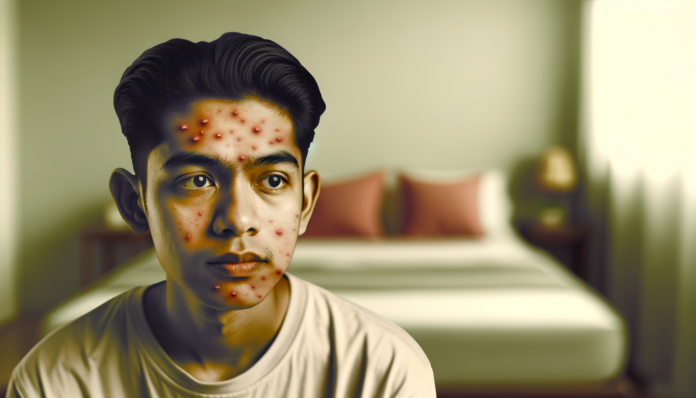Introduction
Overview of Acne and Its Impact
Acne is a common skin condition that affects millions of people worldwide, transcending age, gender, and ethnicity. Characterized by pimples, blackheads, whiteheads, and sometimes cysts, acne can appear on the face, back, chest, and other parts of the body. While often dismissed as a mere cosmetic issue, acne can have profound psychological and emotional impacts. Individuals suffering from acne may experience lowered self-esteem, social anxiety, and even depression. The visible nature of the condition makes it a constant reminder of one’s struggles, often leading to a vicious cycle of stress and worsening skin conditions.
Introduction to Stress Hormones
Stress is an inevitable part of modern life, affecting our mental and physical well-being in numerous ways. One of the primary physiological responses to stress is the release of stress hormones, such as cortisol and adrenaline. These hormones are part of the body’s “fight or flight” response, designed to help us cope with immediate threats. However, chronic stress can lead to prolonged elevated levels of these hormones, which can have detrimental effects on various bodily systems, including the skin. Elevated cortisol levels, in particular, have been linked to increased oil production and inflammation, both of which are key contributors to acne.
Purpose of the Article
The aim of this article is to delve into the surprising and often overlooked connection between stress hormones and acne. By exploring the scientific evidence, mechanisms of action, and real-life examples, we hope to shed light on how stress can exacerbate acne and what can be done to manage it. We will also provide practical advice on stress management techniques, lifestyle changes, and skincare tips specifically tailored for those dealing with stress-induced acne. Ultimately, our goal is to empower readers with the knowledge and tools they need to improve their skin health and overall well-being.
Understanding Acne
What is Acne?
Acne is a common skin condition that occurs when hair follicles become clogged with oil and dead skin cells. It often manifests as pimples, blackheads, whiteheads, or cysts, primarily on the face, neck, chest, back, and shoulders. While acne is most prevalent among teenagers due to hormonal changes, it can affect individuals of all ages. The condition can range from mild to severe and can significantly impact a person’s self-esteem and quality of life.
Common Causes of Acne
Acne can be triggered by a variety of factors, including:
- Hormonal Changes: Fluctuations in hormones, particularly androgens, can increase oil production in the skin, leading to clogged pores and acne. This is why acne is common during puberty, menstruation, pregnancy, and menopause.
- Genetics: A family history of acne can increase the likelihood of developing the condition.
- Diet: Certain foods, especially those high in refined sugars and dairy, can exacerbate acne in some individuals.
- Stress: Elevated stress levels can trigger the release of cortisol and other stress hormones, which can worsen acne.
- Medications: Some medications, including corticosteroids, lithium, and certain birth control pills, can cause or worsen acne.
- Skincare Products: Using products that are not non-comedogenic (i.e., products that clog pores) can contribute to acne.
- Environmental Factors: Pollution and exposure to greasy or oily substances can clog pores and lead to acne.
Types of Acne
Acne can present itself in various forms, each with distinct characteristics:
- Blackheads: Open comedones that appear as small, dark spots on the skin’s surface. They are caused by clogged hair follicles that remain open.
- Whiteheads: Closed comedones that appear as small, white bumps. These occur when clogged hair follicles are closed off from the air.
- Papules: Small, red, raised bumps that can be tender to the touch. They occur when hair follicles become inflamed.
- Pustules: Similar to papules but filled with pus, making them appear white or yellow at the center.
- Nodules: Large, painful lumps beneath the skin’s surface. They are more severe than papules and pustules and can cause scarring.
- Cysts: Deep, painful, pus-filled lumps beneath the skin. Cystic acne is the most severe form and often leads to scarring.
Understanding the different types of acne and their causes is crucial for effective treatment and management. By identifying the specific factors contributing to your acne, you can tailor your skincare routine and lifestyle choices to better address the condition.
The Role of Stress Hormones
What are Stress Hormones?
Stress hormones are biochemical messengers released by the body in response to stress. The primary stress hormone is cortisol, often referred to as the “stress hormone” due to its significant role in the body’s stress response. Other stress hormones include adrenaline and norepinephrine, which are part of the body’s “fight or flight” response. These hormones are produced by the adrenal glands and are crucial for managing stress, but their prolonged elevation can have detrimental effects on various bodily functions, including skin health.
How Stress Hormones Affect the Body
When the body perceives stress, the hypothalamic-pituitary-adrenal (HPA) axis is activated, leading to the release of cortisol and other stress hormones. These hormones prepare the body to deal with immediate threats by increasing heart rate, blood pressure, and energy supplies. However, chronic stress keeps cortisol levels elevated, which can disrupt various bodily functions.
Consistently high cortisol levels can inhibit the production of collagen, hyaluronic acid, and healthy lipids like ceramides. Collagen is essential for maintaining skin structure and preventing wrinkles, while hyaluronic acid keeps the skin hydrated and plump. Ceramides form a barrier that locks moisture into the skin. When these elements are compromised, the skin becomes more susceptible to dryness, irritation, and aging.
Connection Between Stress and Skin Health
The link between stress and skin health is well-documented. Elevated cortisol levels can lead to increased oil production, which clogs pores and results in acne breakouts. Stress hormones also weaken the skin’s barrier function, making it less effective at retaining moisture and more susceptible to irritants and pathogens. This can lead to conditions like eczema, psoriasis, and rosacea becoming more severe.
Moreover, stress-induced inflammation can exacerbate existing skin conditions. For instance, cortisol can trigger the release of pro-inflammatory cytokines, which can worsen acne and other inflammatory skin conditions. The skin’s microbiome, which acts as the first line of defense against pathogens, is also disrupted by stress hormones, making the skin more vulnerable to infections and irritations.
In summary, stress hormones like cortisol play a significant role in skin health. They can lead to increased oil production, weakened skin barriers, and heightened inflammation, all of which contribute to acne and other skin issues. Understanding the impact of stress hormones on the skin is crucial for managing and preventing stress-induced skin problems.
Scientific Evidence Linking Stress Hormones to Acne
Research Studies and Findings
Numerous studies have established a clear link between stress hormones and acne. Research has shown that elevated levels of cortisol, a primary stress hormone, can exacerbate acne by increasing inflammation and sebum production. A study published in the “Journal of Investigative Dermatology” found that students experienced more severe acne during exam periods, a time of heightened stress, compared to less stressful periods. Another study in “Acta Dermato-Venereologica” demonstrated that individuals with higher stress levels had significantly worse acne severity, underscoring the role of psychological stress in skin health.
Mechanisms of Action
The mechanisms through which stress hormones affect acne are multifaceted. **Cortisol**, often referred to as the “stress hormone,” plays a pivotal role. When the body is under stress, the hypothalamic-pituitary-adrenal (HPA) axis is activated, leading to the release of cortisol. Elevated cortisol levels can increase the production of sebum, the oily substance that can clog pores and lead to acne. Additionally, cortisol can weaken the skin’s barrier function, making it more susceptible to infections and inflammation. This hormone also stimulates the release of pro-inflammatory cytokines, which can exacerbate acne lesions.
Another key player is **adrenaline**, which is released during the body’s “fight or flight” response. Adrenaline can strip moisture from the skin, leading to dryness. To compensate, the skin may produce more sebum, creating an environment conducive to acne development. Furthermore, stress can disrupt the balance of the skin microbiome, allowing acne-causing bacteria to proliferate.
Case Studies and Real-Life Examples
Real-life examples and case studies further illustrate the impact of stress hormones on acne. For instance, a case study involving a 25-year-old woman revealed that her acne flare-ups were closely linked to her stressful job. Despite using various acne treatments, her condition only improved after she adopted stress management techniques such as yoga and meditation.
Another example involves teenagers, a group particularly susceptible to both stress and acne. A high school student reported severe acne breakouts during the college application process. Dermatological treatments provided temporary relief, but significant improvement was observed only after the student incorporated regular exercise and mindfulness practices into his routine.
In conclusion, the scientific evidence linking stress hormones to acne is robust and multifaceted. Research studies, mechanisms of action, and real-life examples all point to the significant role that stress hormones play in exacerbating acne. Understanding these connections can help in developing more effective treatment and management strategies for stress-induced acne.
Managing Stress to Improve Skin Health
Stress Management Techniques
Managing stress is crucial for maintaining healthy skin, especially if you are prone to stress-induced acne. Here are some effective techniques:
- Mindfulness and Meditation: Practices such as deep breathing, meditation, and yoga can help reduce stress levels. These activities promote relaxation and can lower cortisol levels, which in turn can help reduce acne flare-ups.
- Physical Exercise: Regular physical activity can help manage stress by releasing endorphins, the body’s natural mood lifters. Whether it’s a brisk walk, a run, or a yoga session, exercise can help keep stress at bay.
- Time Management: Organizing your day and prioritizing tasks can help reduce feelings of being overwhelmed. Effective time management can provide a sense of control and reduce stress.
Lifestyle Changes
Incorporating certain lifestyle changes can significantly impact your stress levels and, consequently, your skin health:
- Healthy Diet: Consuming a balanced diet rich in vitamins and minerals can help your body manage stress better. Foods high in antioxidants, such as fruits and vegetables, can help combat the oxidative stress that contributes to acne.
- Hydration: Staying well-hydrated is essential for maintaining skin health. Water helps flush out toxins and keeps your skin hydrated, reducing the likelihood of breakouts.
- Sleep: Quality sleep is vital for stress management and skin health. Aim for 7-9 hours of sleep per night to allow your body to repair and rejuvenate.
Skincare Tips for Stress-Induced Acne
When stress triggers acne, a targeted skincare routine can help manage and reduce breakouts:
- Gentle Cleansing: Use a gentle cleanser to remove excess oil and impurities without stripping your skin of its natural moisture. Over-cleansing can exacerbate acne by irritating the skin.
- Targeted Treatments: Incorporate products containing salicylic acid, benzoyl peroxide, or retinols. Salicylic acid helps unclog pores, benzoyl peroxide reduces inflammation and bacteria, and retinols promote cell turnover.
- Moisturizing: Even if you have oily skin, it’s important to use a non-comedogenic moisturizer to maintain your skin’s barrier function and prevent overproduction of sebum.
- Pimple Patches: For large, cystic acne, pimple patches can be effective. They allow acne treatment products to penetrate deeply and can provide pain relief.
- Consistency: Stick to your skincare routine even when you’re feeling stressed. Consistency is key to managing acne and maintaining healthy skin.
By integrating these stress management techniques, lifestyle changes, and targeted skincare tips, you can significantly improve your skin health and reduce the impact of stress-induced acne. Remember, managing stress is not just about improving your skin; it’s about enhancing your overall well-being.
Holistic Approaches to Acne Treatment
Diet and Nutrition
The saying “you are what you eat” holds significant truth when it comes to skin health. A balanced diet rich in essential nutrients can play a pivotal role in managing acne. **Antioxidants**, **vitamins**, and **omega-3 fatty acids** are particularly beneficial. Foods high in antioxidants, such as berries, nuts, and leafy greens, help combat inflammation and oxidative stress, which can exacerbate acne. Omega-3 fatty acids, found in fish like salmon and flaxseeds, have anti-inflammatory properties that can reduce the severity of acne.
**Hydration** is another crucial aspect. Drinking plenty of water helps maintain skin elasticity and promotes efficient toxin removal, which can counteract some of the negative effects of stress. Avoiding high-glycemic foods and dairy products can also be beneficial, as these have been linked to increased acne breakouts. Instead, opt for whole grains, lean proteins, and plenty of fruits and vegetables to support overall skin health.
Exercise and Physical Activity
Regular physical activity is not only good for your body but also for your skin. Exercise increases blood flow, which helps nourish skin cells and keep them vital. It also helps to flush cellular debris out of the system, which can be particularly beneficial for those suffering from acne. Moreover, exercise reduces stress by releasing endorphins, the body’s natural mood lifters, which can help lower cortisol levels and, in turn, reduce acne flare-ups.
**Consistency** is key. Aim for at least 30 minutes of moderate exercise most days of the week. Activities like yoga, jogging, swimming, or even brisk walking can make a significant difference. However, it’s important to shower and cleanse your skin after exercising to remove sweat and bacteria that can clog pores and lead to breakouts.
Mindfulness and Meditation
Mindfulness and meditation are powerful tools for managing stress, which is a known trigger for acne. Practicing mindfulness helps you stay present and reduces anxiety, which can lower cortisol levels. Meditation, even for just 10 minutes a day, can have a profound impact on your overall well-being and skin health.
**Deep breathing exercises** and **guided imagery** are effective techniques. These practices help calm the mind and reduce the physiological effects of stress. Incorporating mindfulness into your daily routine can be as simple as taking a few moments to focus on your breath or engaging in a short meditation session before bed.
**Yoga** is another excellent practice that combines physical activity with mindfulness. It helps reduce stress, improve circulation, and promote a sense of well-being, all of which can contribute to clearer skin.
In conclusion, a holistic approach to acne treatment that includes a balanced diet, regular exercise, and mindfulness practices can significantly improve skin health. By addressing the root causes of stress and inflammation, you can achieve a clearer, more radiant complexion.
Conclusion
Summary of Key Points
In this article, we have delved into the intricate relationship between stress hormones and acne. We began by understanding what acne is, its common causes, and the various types that affect individuals. We then explored the role of stress hormones, particularly cortisol, and how they impact the body and skin health. Scientific evidence was presented to establish a clear link between stress hormones and acne, supported by research studies, mechanisms of action, and real-life examples. Finally, we discussed practical strategies for managing stress to improve skin health, including stress management techniques, lifestyle changes, and skincare tips. Holistic approaches such as diet, exercise, and mindfulness were also highlighted as effective methods for treating acne.
Encouragement for Further Exploration
Understanding the connection between stress and acne is just the beginning. We encourage you to delve deeper into the subject by exploring additional resources and consulting with healthcare professionals. Consider keeping a stress diary to identify triggers and patterns in your skin’s behavior. Experiment with different stress management techniques to find what works best for you. Remember, the journey to clear skin is multifaceted and requires a comprehensive approach that includes both internal and external care.
Final Thoughts
Stress is an inevitable part of life, but its impact on your skin doesn’t have to be. By recognizing the role of stress hormones in acne development, you can take proactive steps to manage stress and improve your skin health. Incorporate stress-reducing practices into your daily routine, maintain a balanced diet, stay hydrated, and prioritize self-care. Your skin is a reflection of your overall well-being, and by addressing the root causes of stress, you can achieve a clearer, healthier complexion. Remember, the journey to radiant skin is a marathon, not a sprint. Stay patient, stay consistent, and most importantly, be kind to yourself.



